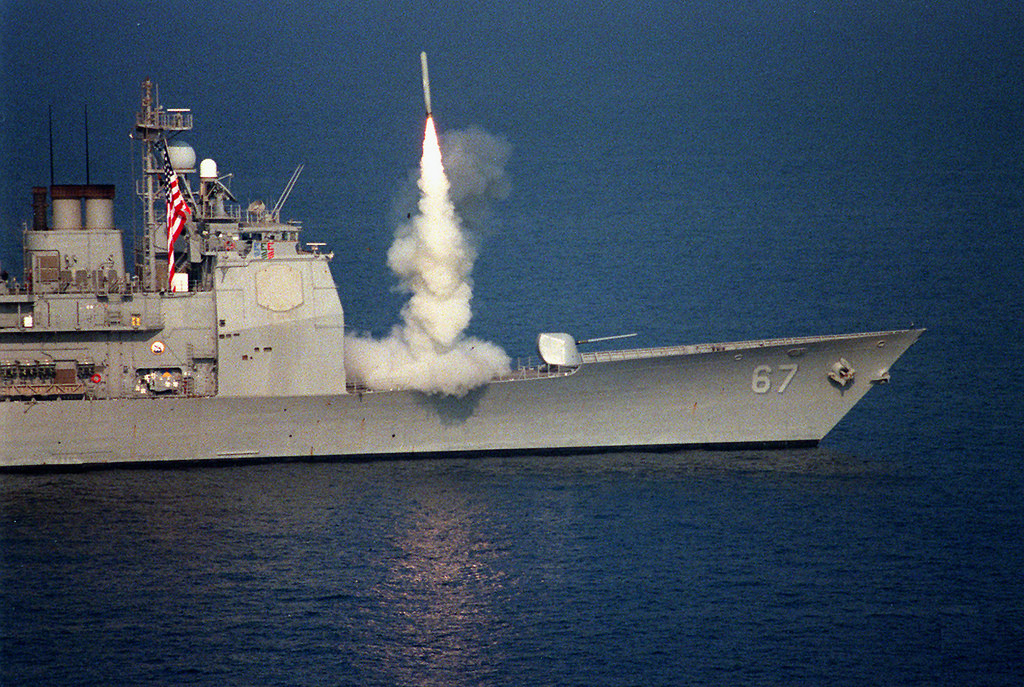The U.S. missile strike on a Syrian air base, Thursday raises a number of questions about President Donald Trump’s true intentions in the region. President Trump announced that the strike was in retaliation for Syria’s chemical weapons attack on a town in the northern part of the country, earlier in the week. But after six years of war, 300,000 dead, five million refugees and now 59 cruise missiles, fired 100 years to the day after the U.S. entered the war in which chemical weapons were first used, many are asking what will happen next?
The Trump administration had not previously signaled that it intended to oppose Syria’s actions. The President has said that regime change in Sura is not a U.S. objective, as it had been during part of President Barack Obama’s administration. But that was before the chemical attack. In announcing the missile strike, Trump said of the Syrian victims,“No child of God should ever suffer such horror.”
Jeremi Suri, professor, and chair for leadership in global affairs at the LBJ School of Public Affairs in Austin says that while President Trump was clearly moved by the carnage of the attack, it isn’t clear what he hopes to accomplish by sending missiles to Syria.
“The president has said that he is not in favor of removing [Syrian president] Bashar al-Assad and that he’s not in favor of nation building,” Suri says. “And he has said that Russia is a partner of ours. But what we have done is we have attacked Russia’s close ally, and we have attacked the government that we’re claiming we’re not going to overthrow. We’ve also attacked an enemy of ISIS. And the President had said that our strategy in the Middle East was focused on defeating ISIS. So to tell you the truth, I don’t think anyone knows what the President’s strategy really is. I’m not sure he has one.”
Thursday’s missile strikes came as President Trump was meeting in Florida with Chinese President Xi Jinping. The relationship between the U.S. and China has been fraught since Trump, who attacked Chinese trade and military policy as a candidate for president, assumed office.
Hans Stockton, director of the Center for International Studies at the University of St. Thomas in Houston says striking Syria was also an attempt to put China on notice that the U.S. will take aggressive action to defend what it sees as its interests, including those in Asia.
“President Trump has made repeated bellicose statements with regard to U.S. relations with China, as well as North Korea – most recently indicating that the United States would ‘solve North Korea’ if the Chinese government did not reign North Korea’s nuclear program in,” Stockton says. “I think the missile strikes in Syria were a very strong signal that Mr. Trump is not just ‘big hat no cattle.’”
Suri says striking Syria puts the U.S. in the position of waiting to see how other nations will respond, rather than dictating terms to others.
“I think the problem with an air strike like this, without any clear strategy for next steps is that it puts the ball in the court of the other actors, and it makes us the reactor,” he says. “Strategy 101 says that you want to be the agenda setter, not the one responding to others. What happens tomorrow if Assad launches another chemical attack?
Suri says waiting to see what others will do in a time of conflict has not worked out well in past wars.
“I’m not saying we shouldn’t respond with military force, but I am saying that the one lesson of history is that force has to be closely tied to a clear strategy, with next steps designed to move the policy issues forward, rather than just react to what the bad guys do next,“ he says.
The lack of a clear strategy also complicates relationships with countries in Asia, even if the U.S. is not engaged in conflicts with them, Stockton says.
“This is something that’s befuddled Asian experts, as well as the Chinese, and our allies throughout the region,” he says. “There does not appear to be a strategy – a Trump doctrine, so to speak – with regard to east Asia.”
At home, members of Congress and others have expressed concern that the President did not seek authorization to attack Syria, a sovereign nation. Suri says past presidents have also found justifications for bypassing Congress when they wanted to take military action.
“The argument is, and this grows out of American military and strategic doctrine in the Cold War –is that the president of the United States and the National Security Council have the power to initiate a strike out of self-defense, or compelling national interest,” he says. “But the President does have to report to Congress, and any long-term operation will require Congressional authorization.”
Critics of President Trump, mindful of the various investigations and controversies surrounding his administration, are likely to suggest that the Syrian missile strikes are, at least partially, an attempt by the administration to change the subject. Suri says that strategy rarely works out for the president, whoever he is.
“This is an issue I’ve studied quite a lot in other presidential administrations – the so-called ‘wag the dog’ scenario,” he says. “There are fewer restraints, as we saw last night, on foreign policy than there are in domestic policy. And so presidents who feel embattled, presidents who feel stymied look to toughness on foreign policy as a way of showing their capabilities. And I think that’s part of what we’ve seen here. But I will say the historical record shows that almost always ends in disaster because when you undertake international activity without a basis of support at home, you always quickly lose that initial bump that you get.”
Stockton agrees, and cautions that showy aggression in Asia has a lot of risks. “With regard to being strong, visa a vis China, there’s no way you want to take on a bigger power like that,” he says.
Written by Shelly Brisbin.
















